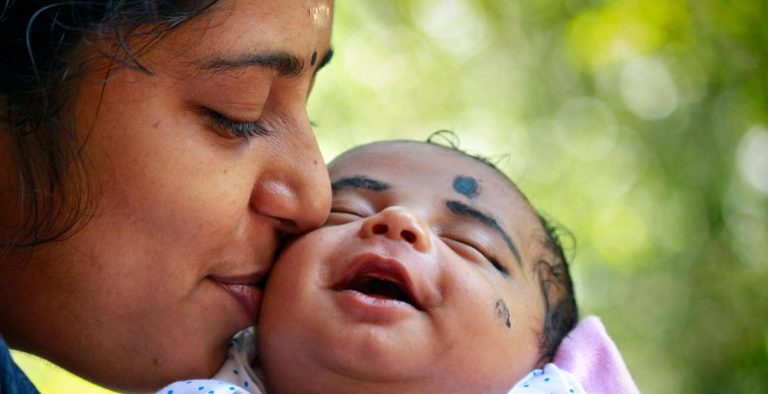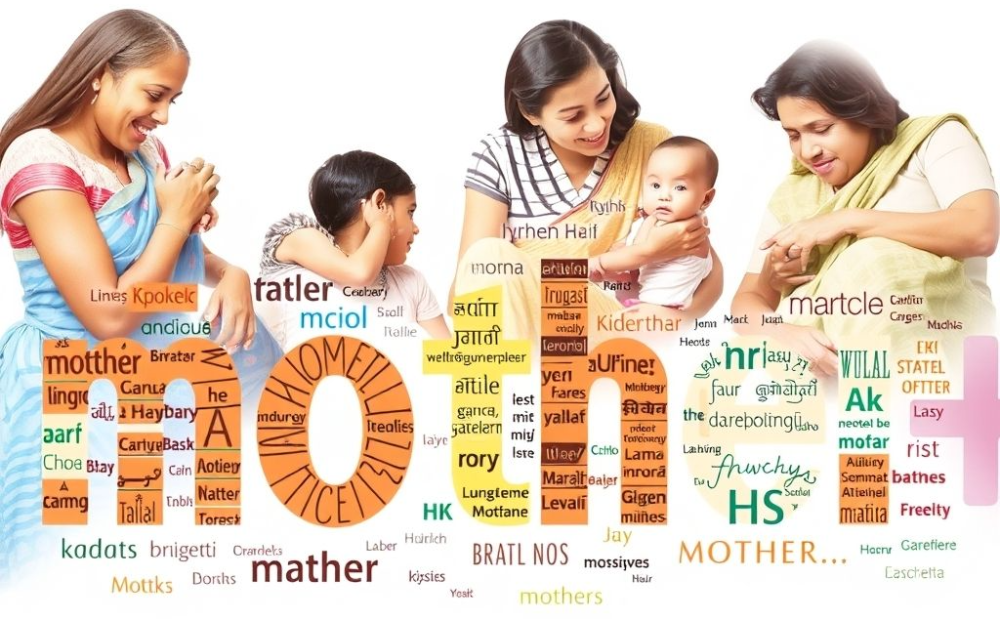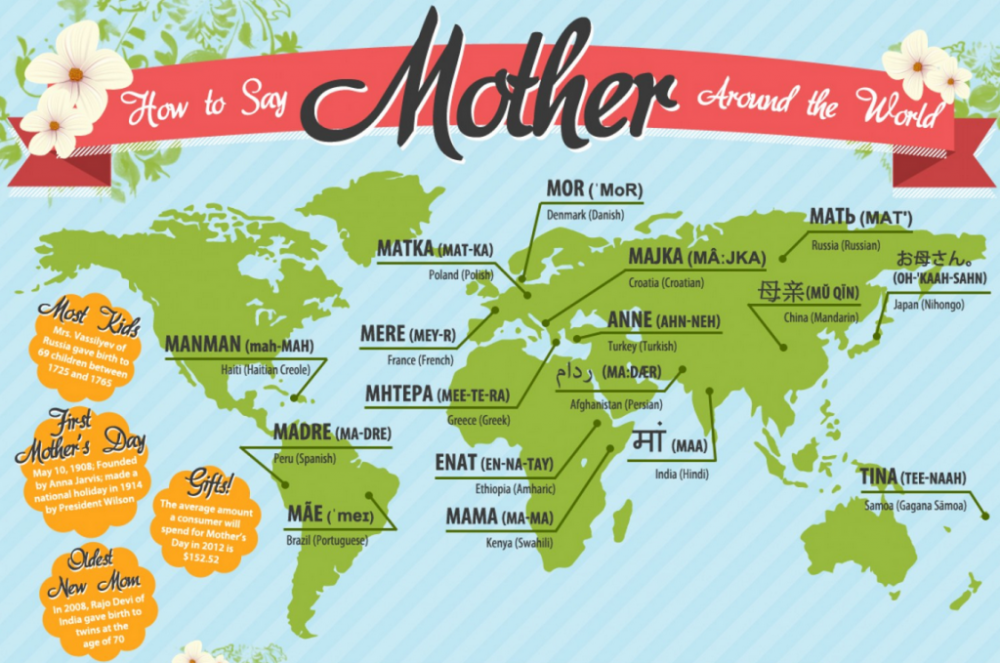
Linguistic research reveals ancient patterns in how different civilizations developed nearly identical terms for “mother” across thousands of languages
New York, N.Y. – The word “mother” might be the most universal sound in human language. From the English “mama” to the Mandarin “māma,” the Hindi “mā,” and the Swahili “mama,” remarkably similar sounds emerge across vastly different language families and geographic regions.
This linguistic phenomenon has fascinated researchers for generations, revealing profound connections between human development, cognitive science, and cultural evolution.

The Biology Behind the Sound

Dr. Elena Mendoza, professor of comparative linguistics at Columbia University, explains that this similarity isn’t coincidental. “The ‘m’ sound is typically one of the first consonants babies can produce. When infants begin experimenting with vocalization, the bilabial nasal sound—made by closing the lips while allowing air through the nose—naturally emerges during feeding,” she says.
This biological foundation creates a pattern where infants across cultures produce similar sounds when interacting with their primary caregivers. These utterances—often duplicated syllables like “mama,” “amma,” or “eme”—are then reinforced when parents interpret these sounds as the child attempting to name them.
“It’s a beautiful feedback loop,” notes Dr. Thomas Chen, developmental psycholinguist at the University of California, Berkeley. “The infant makes sounds that are physiologically simple, the caregiver responds enthusiastically, and these exchanges become codified in the language.”
Ancient Origins and Universal Patterns

Archaeological linguists trace these maternal terms back to humanity’s earliest languages.
The Proto-Indo-European root “māter” emerged over 6,000 years ago, evolving into “mater” (Latin), “mitēr” (Ancient Greek), and eventually “mother” (English). Yet remarkably similar patterns appear in completely unrelated language families.
“What’s fascinating is finding this pattern in language families that had no contact with each other for tens of thousands of years,” says Dr. Aisha Okafor, historical linguist at Oxford University.
“From Proto-Austronesian to Proto-Bantu to Native American language families, we see m-initial words for mother everywhere.”
This linguistic universality extends beyond the m-sound. Other common maternal terms utilize the “n” consonant (like “nana” or “ana”) or occasionally the “b” sound—all consonants that emerge early in infant development.

Cultural Significance and Variations
While the core sounds remain consistent, cultures elaborate on these basic building blocks in unique ways.
Japanese distinguishes between “mama” (informal) and “okāsan” (formal).
Hindi speakers might use “mā,” “ammā,” or the more respectful “mātājī” depending on context.
“These variations reflect cultural values around family structure, respect hierarchies, and social organization,” explains cultural anthropologist Dr. Maya Rodriguez of New York University.
“The root sound provides the universal foundation, but each society layers meaningful distinctions atop it.”
Technological Confirmation of Ancient Patterns
Modern computational linguistics has strengthened these observations. A 2023 study by the Max Planck Institute for Evolutionary Anthropology analyzed maternal terms across 4,500 languages and found the m-initial pattern appeared in 72% of documented languages, with n-initial terms accounting for another 15%.
Dr. James Watkins, who led the study, notes: “When we map these terms geographically, we can see they transcend traditional language family boundaries. This suggests these words aren’t just inherited or borrowed—they’re repeatedly and independently invented.”
The Emotional Resonance of Mother Words
Beyond linguistics, these terms carry profound psychological significance. “The word for mother often becomes emotionally charged in ways other vocabulary doesn’t,” explains Dr. Samira Hassan, psycholinguist at Stanford University. “These words activate regions in the brain associated with emotional processing and attachment, creating powerful neurological responses.”
This emotional encoding explains why maternal terms often resist language
changes that affect other vocabulary. While pronunciation and grammar
evolve rapidly, words for mother remain remarkably stable across centuries.
As humanity continues to study language evolution, these maternal terms provide a unique window into how biology, psychology, and culture intertwine in human communication. The universality of “mama” reminds us that despite thousands of languages separating global communities, we remain connected by the fundamental experience of being human.

Universal Language of Motherhood Connects Cultures Worldwide (May 11, 2025)
#LanguageScience #MotherhoodUniversal
TAGS: linguistics, mother language, cross-cultural communication, language development, anthropology
Social Media
X
Universal Language Of Motherhood Connects Cultures Worldwide: Science explains why “mama” sounds similar globally. #LanguageScience #Anthropology https://bit.ly/motherwords
Bluesky
Universal Language Of Motherhood Connects Cultures Worldwide: From “mama” to “māma,” discover why mother words sound so similar across thousands of languages. #LinguisticScience #CulturalConnections https://bit.ly/motherwords
Universal Language Of Motherhood Connects Cultures Worldwide
Fascinating research reveals why terms for “mother” remain remarkably consistent across languages, providing insights into human development and communication. This linguistic phenomenon demonstrates how biology shapes culture, with implications for understanding universal human experiences and cognitive development.
The findings highlight how unconscious biological processes create shared patterns across diverse civilizations, revealing fundamental aspects of human connection that transcend cultural boundaries.
#LinguisticAnthropology #HumanDevelopment #CulturalCommunication https://www.stewardshipreport.org/universal-language-of-motherhood-connects-cultures-worldwide
Truth Social
Universal Language Of Motherhood Connects Cultures Worldwide: Research shows why “mama” sounds similar in languages everywhere, revealing biological foundations of human speech. An amazing connection we all share! #LanguageScience #HumanNature https://bit.ly/motherwords
Mastodon
Universal Language Of Motherhood Connects Cultures Worldwide: Did you know the “m” sound in words for mother appears in 72% of documented languages? Scientists attribute this to it being one of the first sounds babies can make. A beautiful example of how biology shapes communication across humanity! #LinguisticScience #CulturalConnections https://bit.ly/motherwords
Universal Language Of Motherhood Connects Cultures Worldwide ✨
From “mama” to “māma” to “amma,” mother words connect us all. Swipe to learn why this fascinating pattern exists across thousands of languages!
#LanguageScience #MotherhoodUniversal #AnthropologyFacts #LinguisticPatterns #CulturalConnections
Link in bio
Universal Language Of Motherhood Connects Cultures Worldwide
Did you know that words for “mother” sound remarkably similar across thousands of languages? This isn’t coincidence—it’s biology! The “m” sound is one of the first consonants babies can produce while feeding, creating a beautiful pattern where nearly every culture independently developed similar terms for motherhood.
Read our full exploration of this fascinating intersection of linguistics, child development, and cultural evolution.
#LanguageScience #CrossCulturalConnections https://www.stewardshipreport.org/universal-language-of-motherhood-connects-cultures-worldwide
Universal Language Of Motherhood Connects Cultures Worldwide
Scientific research reveals why words for “mother” sound similar in thousands of unrelated languages. The biology of infant speech development creates these patterns independently across civilizations.
What other words do you think might show similar universal patterns across languages, and why?
#LinguisticScience #CulturalAnthropology https://www.stewardshipreport.org/universal-language-of-motherhood-connects-cultures-worldwide